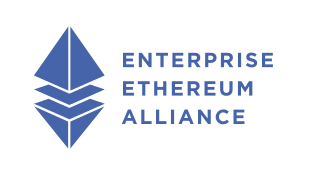EEA Working Groups collaborate to develop open freely-implementable specifications to accelerate the acceptance and deployment of Enterprise Ethereum blockchain solutions within the global marketplace, as well as guidelines and other support materials. Working Groups ensure that specific industry requirements described by the EEA Interest Groups are developed for inclusion in specification development.
Working Groups may produce specifications, or may determine how to use existing standards to resolve problems. They provide support to help EEA members understand what they need, and provide a contact point for the broader community to make requests or ask questions.
Working Groups’ public pages provide up-to-date information on the group’s focus, current publications, and the like.
Working Group Leadership
Client Interoperability Testing
This group provides EEA members with the ability to easily test applications on a conformant EEA Permissioned Blockchain. This enables developers in any part of the ecosystem to perform experiments on different aspects of Enterprise Ethereum blockchains and identify any interoperability bugs or gaps in how the ecosystem currently supports enterprise use cases. The EEA Testing Working Group develops testnets to demonstrate that implementations conform to the EEA specifications and allow EEA members to test new applications.
Client Interoperability Testing Working Group’s public page: https://entethalliance.github.io/testing-wg/
Name |
Role |
Company |
|
|---|---|---|---|
| Antoine Toulmé | Chair | The Machine Consultancy LLC | [email protected] |
CrossChain Interoperability
The CrossChain Interoperability Working Group is focused on enabling code and nodes on a blockchain to call code deployed on a different blockchain, and where appropriate, receive a response. The working group is responsible for developing technical standards to meet this challenge. Its work includes creating a conceptual framework that enables sound reasoning about this topic, identifying salient technical and security challenges that inform the design space, and specifying a protocol architecture to drive standardization and broad adoption.
Crosschain Interoperability WG’s public page: https://entethalliance.github.io/crosschain-interoperability/
Name |
Role |
Company |
|
|---|---|---|---|
| Weijia Zhang | Co-Chair | Wanchain | [email protected] |
| Anaïs Ofranc | Co-Chair | QualitaX | [email protected] |
DeFi Risk Assessment, Management and Accounting (DRAMA)
The EEA Defi Risk Assessment, Management and Accounting (DRAMA) Working Group was formed to address the lack of appropriate, widely-accepted frameworks for identifying and understanding risks associated with DeFi protocols, and the resulting lack of common assessment and accounting criteria for Defi Assets.
WG’s public page: https://entethalliance.org/groups/DRAMA/
Name |
Role |
Company |
|
|---|---|---|---|
| Dyma Budorin | Co-Chair | Hacken | [email protected] |
EthTrust Security Levels
EthTrust seeks to solve the problem of trust in Ethereum transactions. The smart contracts that power Ethereum have been fraught with security issues and today there is still no good way to see how secure an address or contract is before initiating a transaction. EEA members in this group are looking to improve the smart contract security standard and registry system created by the EthTrust project to raise the level of confidence and trust in Ethereum as a global settlement layer for all types of transactions across all types of industry sectors.
EthTrust Security Levels Working Group’s public page: https://entethalliance.github.io/eta-registry/
Name |
Role |
Company |
|
|---|---|---|---|
| Chris Cordi | Co-chair | [email protected] | |
| Opal Graham | Co-Chair | CertiK | [email protected] |
Ethereum Training Quality (Eth TQ)
Since the inception of blockchain, there has been a need for quality educational materials. The vast majority of people have learned about and been introduced to blockchains informally, through friends, videos, social media, etc. There is a lot of blockchain education, but information and courseware is often inaccurate, and can easily become outdated. Importantly, there is generally no indication of whether materials are approved by the industry. This lack of quality standards for educational resources makes it difficult for prospective students to understand whether a particular course will provide a useful outcome in terms of skills, knowledge, and qualifications recognized by industry employers.
The EEA’s Ethereum Training Quality (Eth TQ) Working Group is focused on addressing the lack of quality standards for educational resources by defining what knowledge and skills an individual needs to learn to successfully help an organization understand and adopt blockchain technology.
Ethereum Training Quality Working Group’s public page: https://entethalliance.github.io/EthTQ/
Name |
Role |
Company |
|
|---|---|---|---|
| Sonal Patel | Co-Chair | ConsenSys Mesh | [email protected] |
| Jessica Levesque | Co-Chair | CryptoCurrency Certification Consortium “C4” | [email protected] |

